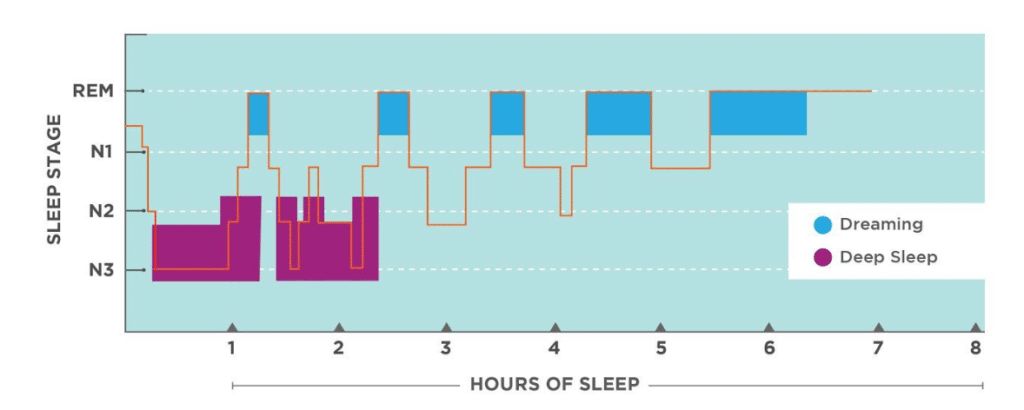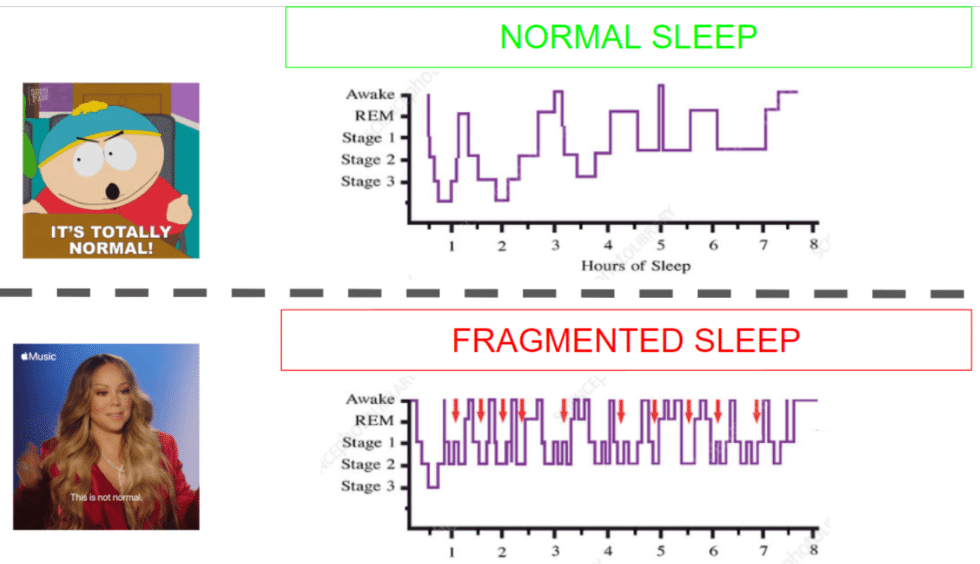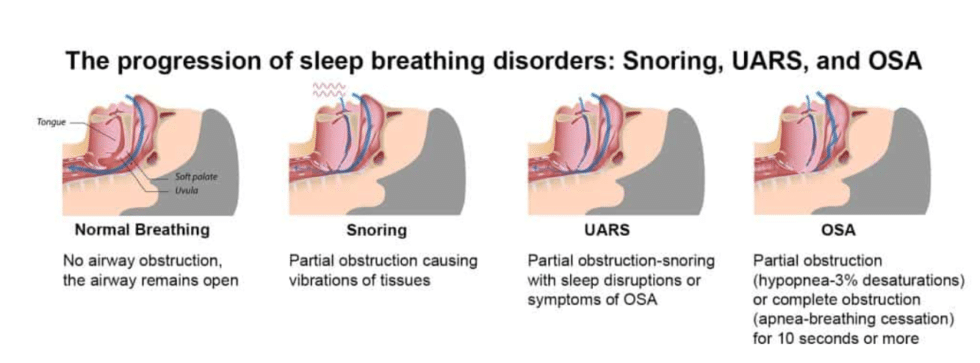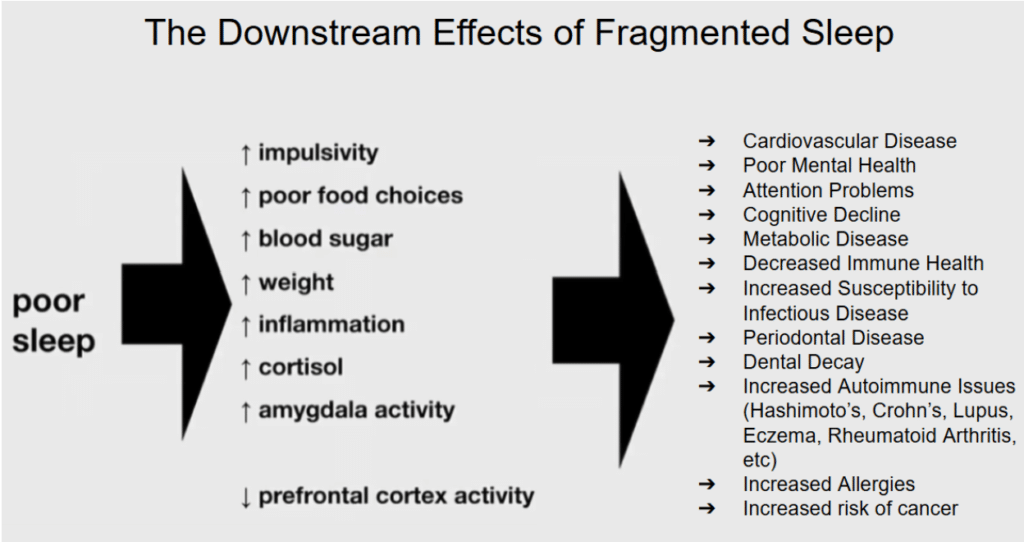Running on insufficient sleep is like trying to drive your car with no gas in the tank, with no oil in the engine, and with 3 flat tires.
Life is good when we are getting sufficient restorative sleep, allowing constant repair of our body and mind. This means that we want to have as many nights of normal sleep cycles as possible.
What’s Normal?
For proper recovery and restoration, a “normal” night of sleep should look something like this:
- About 8 hours of total sleep.
- Around 5 or 6 sleep cycles per night, passing through sleep stages uninterrupted, with each sleep cycle lasting about 90 minutes
- Early in the night, deep Stage 3 sleep predominates. Later in the night, REM sleep increases.
To understand the stages of sleep, which include NON-REM (Stages 1 to 3) and REM sleep, is to understand the importance of a good night’s sleep to our health.
Stage 1 – Transition to Sleep: 5% of total sleep
This is the initial stage when you start to drift off to sleep. Your brain waves slow down, producing alpha and theta waves, and you may experience a relaxed state between wakefulness and sleep. It’s like the moment when you’re lying in bed, feeling drowsy, and your mind starts to wander before you fully fall asleep.
Stage 2 – Light Sleep: 50% of total sleep
In this stage, your brain activity further slows down, and your body temperature drops. This is the stage where you spend the majority of your sleep. During light sleep, your body is still responsive to external stimuli, and you may have brief moments of wakefulness. It’s like those times when you’re easily awakened by a noise outside or a slight disturbance in your surroundings.
Stage 3 – Deep Sleep: 20% of total sleep
Deep sleep, or Slow Wave Sleep (SWS), is the stage where your body and mind rejuvenate and restore themselves. Your brain waves slow down even further, and your muscles relax. It’s during deep sleep that your body releases growth hormone, repairs tissues, and strengthens the immune system. It’s harder to wake up during this stage, and your brain produces slow delta waves. If you’ve ever had a night of deep, uninterrupted sleep, you wake up feeling refreshed and energized the next day.
REM Sleep – Dream Sleep: 25% of total sleep
REM (Rapid Eye Movement) sleep is the stage associated with dreaming. Your brain becomes highly active, and your eyes move rapidly. This stage is essential for cognitive function, emotional regulation, and memory consolidation. During REM sleep, muscles are relaxed and your body is temporarily paralyzed to prevent acting out your dreams. It’s when you experience vivid and immersive dreams, and if you wake up during this stage, you may recall the details of your dream.

What’s Not Normal?
Abnormal sleep is represented by fragmentation of the sleep cycles. Rather than five or six high quality 90 minute sleep cycles with the proper percentage of and progression through each sleep stage, this results in multiple very short and inefficient sleep cycles with disruption of the deep sleep stages. The compromise of these critical restorative sleep stages results in an inability for the body to complete necessary reparation of cells to recover from daily damage. Imagine sitting down to complete a task and every time you really get focused and productive, the phone rings. The quality of completion of the task suffers.

Factors in and Effects of Poor Quality Sleep
While sleep quality can be affected by a number of factors, Sleep Disordered Breathing (SDB) is the most common and profound factor. With any airflow restriction during sleep, our bodies abruptly go from a parasympathetic restful state into a sympathetic fight-of-flight state in order to reopen the airway to get sufficient oxygen to the tissues for homeostasis.

Sleep disordered breathing episodes typically occur during the restorative sleep stages accompanied by muscle relaxation, Deep (SWS) Stage 3 sleep and REM sleep. The effect is a series of abrupt distractions from repair and restoration during sleep, resulting in a cumulative decrease in the body’s ability to complete necessary maintenance. Over time, this correlates with a number of chronic health adversities.

The downstream effects of poor sleep are rooted in an increased systemic state of stress and inflammation. In adults, the downstream effects of fragmented sleep are increased risk of a garden variety of chronic disease. In kids, fragmented sleep’s most concerning effects involve cognitive development and proper growth.
Aside from the #1 Stunner, sleep disordered breathing, these are some other common factors with ill effects on sleep quality:
- Artificial Light Exposure
- Altered Circadian Rhythm
- Late Meals
- Alcohol
- Caffeine
- Late Exercise
How to Optimize Your Sleep
A wearable device, like an Oura Ring, is a great way to track how different things affect your sleep quality. I have one and I learn a lot from seeing how my sleep cycles and restful indicators are affected by things like having a drink at night, amount of time spent outdoors, late meals, activity levels.
Regardless, these are some low hanging fruit things that you can incorporate into your lifestyle to make natural improvements to your sleep:
- BREATHING!!!
- Nasal breathing MUST be maintained throughout the night for proper sleep cycles.
- If the mouth is open → the tongue falls down and back into the airway → airflow is restricted → parasympathetic restful sleep is now fragmented into sympathetic restless sleep to restore the balance of airflow and gas exchange → Restorative deep slow wave sleep and REM sleep are reduced. Use the Oxygen Advantage App. Practice daily GOPex exercises to train closed subconscious mouth posture. See my Airway Workout blog to understand the role of mouth tape, muscle tone, etc.
- Temperature:
- Body temp cools before sleep. Take a hot bath before bed.
- Body temp rises before waking. Take a cold shower in the morning.
- Light Exposure:
- Lots of light (eyes and skin) upon waking. Get outside early and be in the sun for at least 3 min.
- Minimal artificial light before sleep. Stay off screens, keep room lights low, use red light when possible..
- Exercise:
- Vigorous exercise puts the body in sympathetic mode. Ideally, strenuous exercise should be early to mid day.
- Light exercise is beneficial in the evening. Go for a walk after dinner.
- Timing of Eating:
- The body needs time to digest to allow for optimal sleep. Try not to eat within 3 hours of bedtime.
- Caffeine:
- Do your coffee 90 minutes after waking.
- No more coffee after 2:00 (or whatever time you find to be the deadline for you)
- Circadian Rhythm
- Our bodies thrive on consistency. Be as consistent as possible with sleep and wake times, as well as light exposure.
As a reminder, my blogs are never designed to take the place of diagnosis or treatment by qualified medical professionals. Rather, their full intention is to arm you with an understanding of health and to empower you with ways that you can make lifestyle changes to naturally improve your health.



